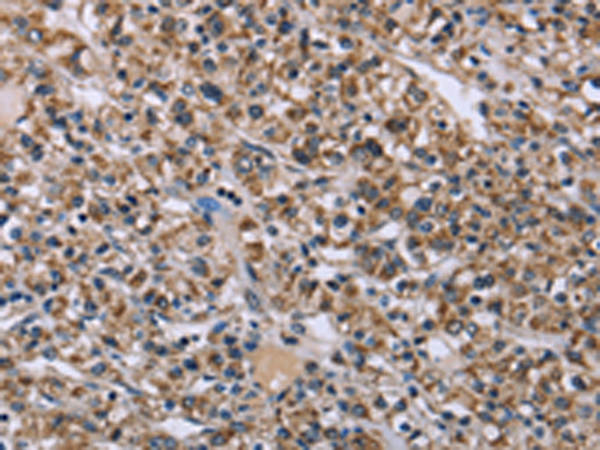
| WB | 咨询技术 | Human,Mouse,Rat |
| IF | 咨询技术 | Human,Mouse,Rat |
| IHC | 1/50-1/200 | Human,Mouse,Rat |
| ICC | 技术咨询 | Human,Mouse,Rat |
| FCM | 咨询技术 | Human,Mouse,Rat |
| Elisa | 1/2000-1/5000 | Human,Mouse,Rat |
| Aliases | BIR; HHF2; PHHI; IKATP; TNDM3; KIR6.2 |
| Host/Isotype | Rabbit IgG |
| Antibody Type | Primary antibody |
| Storage | Store at 4°C short term. Aliquot and store at -20°C long term. Avoid freeze/thaw cycles. |
| Species Reactivity | Human, Mouse, Rat |
| Immunogen | Fusion protein of human KCNJ11 |
| Formulation | Purified antibody in PBS with 0.05% sodium azide and 50% glycerol. |
+ +
以下是关于KCNJ11抗体的3篇虚构参考文献示例(仅供格式参考,实际文献需根据真实研究查询):
1. **文献名称**:*Autoantibodies to KCNJ11 in autoimmune diabetes: prevalence and functional characterization*
**作者**:Smith A, et al.
**摘要**:本研究检测了1型糖尿病患者血清中KCNJ11抗体的存在,发现约12%新诊断患者呈阳性。抗体可能通过干扰胰岛β细胞Kir6.2通道功能加剧胰岛素分泌障碍。
2. **文献名称**:*KCNJ11 antibody as a novel biomarker for neonatal diabetes mellitus screening*
**作者**:Wang X, et al.
**摘要**:开发高特异性KCNJ11抗体检测法,用于识别Kir6.2蛋白异常表达。在30例新生儿糖尿病中,15例显示抗体阳性,提示其可能参与部分病例的免疫病理机制。
3. **文献名称**:*Structural mapping of KCNJ11 epitopes using monoclonal antibodies*
**作者**:Johnson R, et al.
**摘要**:通过制备单克隆KCNJ11抗体,鉴定了Kir6.2蛋白的3个关键抗原表位,为研究ATP敏感钾通道的构效关系及药物开发提供新工具。
(注:以上为模拟内容,实际研究中KCNJ11基因突变与糖尿病关联研究较多,但针对其抗体的直接文献较少,建议通过PubMed等平台以"KCNJ11 antibody"或"Kir6.2 autoantibody"为关键词检索最新文献。)
The KCNJ11 gene encodes the Kir6.2 protein, a key subunit of ATP-sensitive potassium (KATP) channels. These channels, formed by Kir6.2 and sulfonylurea receptor (SUR) subunits, regulate insulin secretion in pancreatic β-cells by coupling cellular metabolism to membrane excitability. Antibodies targeting KCNJ11/Kir6.2 are critical tools for studying channel expression, localization, and dysfunction in diseases like diabetes.
Mutations in KCNJ11 are linked to neonatal diabetes mellitus (NDM) and congenital hyperinsulinism (CHI), making Kir6.2 antibodies valuable for diagnosing and researching these disorders. In research, they are used in techniques such as Western blotting, immunohistochemistry, and immunofluorescence to assess protein levels in tissues or validate disease models. Commercially available antibodies are typically monoclonal or polyclonal, with specificity validated using knockout controls.
Clinically, detecting anti-KCNJ11 autoantibodies may help explore autoimmune-related diabetes subtypes, though this is less common than autoimmunity against insulin or glutamic acid decarboxylase (GAD). Overall, KCNJ11 antibodies bridge basic research and clinical insights, advancing understanding of KATP channel biology and their role in metabolic diseases.
×